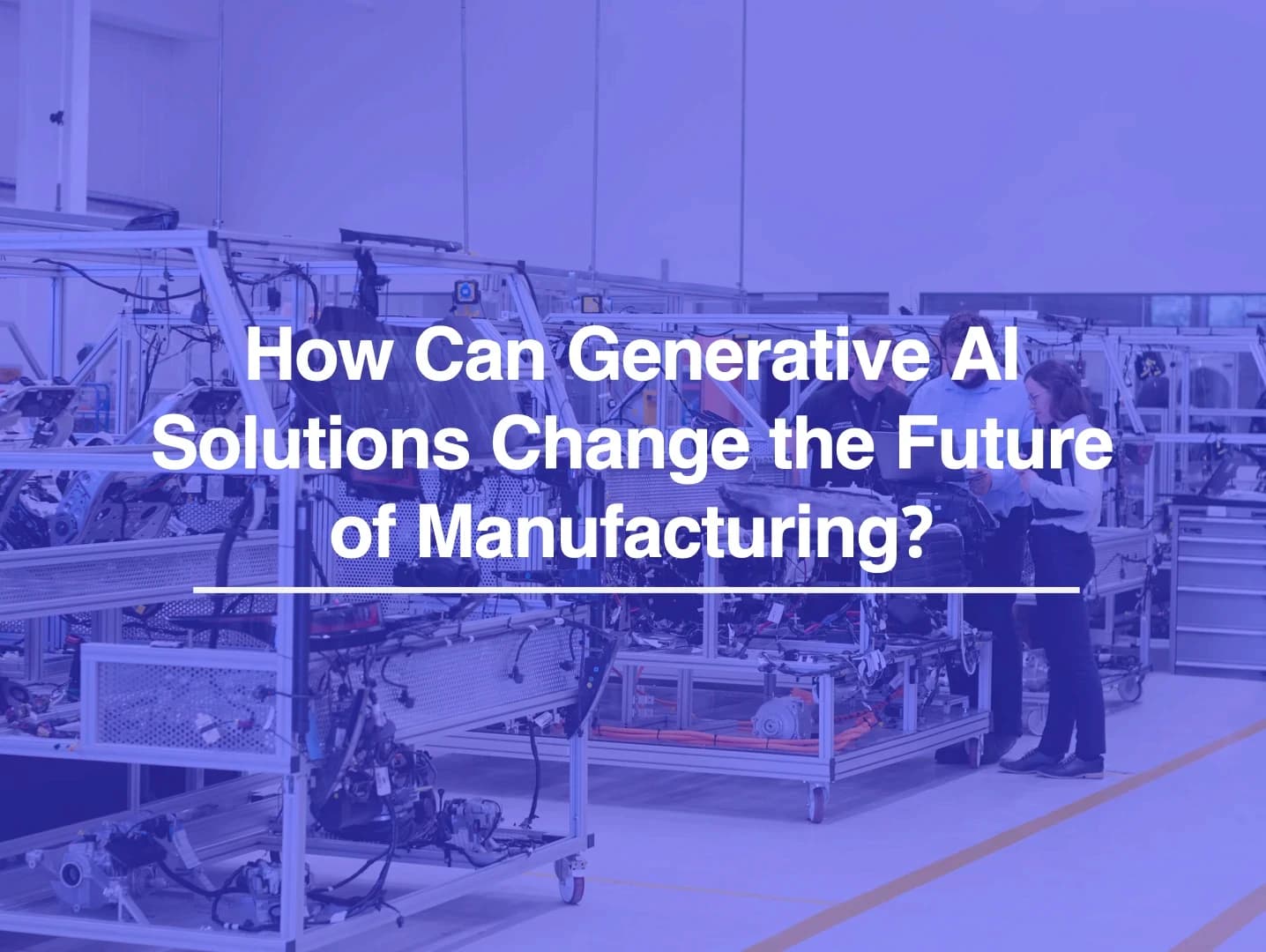How can Generative AI Solutions Change the Future of manufacturing?
by Reo Ogusu, Co-founder / CTO

Embracing New Technology in Manufacturing
When it comes to embracing new technology, manufacturing has always been on the front foot.
Over the years, numerous technologies have been adopted and designed to improve the manufacturing process and increase productivity. These include the rise of robotics in the 1960s, the creation of computer-aided design (CAD) in the 1970s, and, more recently, the use of artificial intelligence (AI).
Nowadays, artificial intelligence is widely used as a collective term for various technologies. Thanks to its flexibility and functionality, AI is utilized in one form or another by countless manufacturers. However, it’s the subgenre of generative AI that still holds untapped potential for the sector.
In this article, we talk to Seeai cofounder Reo Ogusu about generative AI solutions in more detail. We’ll cover what generative AI is, where manufacturers could use it, and how it could be harnessed to release a range of business benefits.
What is AI and How Has It Traditionally Been Used by Manufacturers?
Artificial Intelligence technology allows machines to perform tasks requiring human-level capabilities, such as visual recognition, speech recognition, decision-making, and language understanding. The system can interact with the environment, learn from it, and improve itself.
Within today’s broad use of the term AI, there are many different subsets and applications. For most manufacturers, AI has traditionally been used to create smarter factories. Here are a few examples of various subsets in action:
- Machine Learning in Stock Control: Enables computers to predict customer demand or supply chain requirements based on past data and performance.
- AI Combined with Mechanical Systems: Creates robotic machines that can operate autonomously or with minimal human support.
- Computer Vision: Enables computers to interpret and understand visual information from images or videos, such as identifying product defects on the production line and removing the affected items before they go to market.
What is Generative AI?
Generative AI refers to a specific class of artificial intelligence that involves creating new data (such as images, text, video, or audio) based on patterns learned from existing data. Years ago, generating high-quality text and images was considered impossible. However, with recent breakthroughs in training these generative AI models, they are now capable of generating text, images, audio, and even videos of impressive quality.
The generative AI that we especially focus on is Large Language Models (LLMs). You might be more familiar with this technology as the one behind ChatGPT. LLMs have learned from vast amounts of web data, books, and programs written in various languages worldwide and can solve various tasks using that knowledge and information.
LLMs are predicted to have an impact similar to that of computers and the internet. It is a new tool that will change the way we work. This versatile technology can provide benefits to manufacturing organizations, allowing them to significantly increase productivity in areas beyond the production line.
How Can Generative AI Be Used in Manufacturing?
Through generative AI, such as Large Language Models (LLMs), there are countless opportunities to automate time-consuming processes in manufacturing. This can help increase productivity, streamline your business, and free up your team for tasks more fitting for their experience and expertise. Here are four different uses of generative AI in manufacturing:
- Generating Regulatory Compliance Documents: Keeping up with compliance is essential for manufacturing companies. Generative AI (specifically LLMs) can help produce and update regulatory compliance documents to ensure you stay ahead.
- Marketing Support: Personalizing your marketing materials, such as product brochures, is a great way to showcase your offering while keeping your customers in mind. Using generative AI (LLMs) in your marketing production process can generate content specifically tailored for each client.
- Inventory Data Cleaning: Manufacturing companies often hold vast databases of inventory items and product details. Due to manual data entry and integration from various sources, the database can suffer from issues such as duplicate records, inconsistent naming, and outdated information. Generative AI (LLMs) can intelligently clean data, making it more reliable, robust, and easier to draw insights from.
- Customer Support: While some customer interactions require a human touch, generative AI can handle emails, chats, and phone calls where appropriate. This ability can free up customer-facing colleagues to prioritize tasks that require their skills, reduce response times, and increase engagement levels where resources were previously limited.
How Can Manufacturers Make the Most of Generative AI?
Top tip
Bringing AI experts into this conversation can help. At Seeai, we work closely with clients to uncover potential paths and solutions. By combining their experience with our technical expertise, we can unlock potential talking points that might not otherwise have come up.

Common Mistakes When Exploring Generative AI
Managing expectations is key. If you set your sights too low, you’ll miss out on potential. For instance, ChatGPT is often cited as an example of what LLMs can achieve, but it has limitations like limited access to recent news and data, slow responses, and lack of access to your internal information. Many people underestimate what LLMs are capable of.
LLMs can be augmented with different tools and databases to make them more personalized to your organization's needs. By developing a system to inject the right contextual information, you can control it to fit your specific business processes.
Remember that AI is not a silver bullet. It can help automate and optimize routines and unlock new opportunities, but it’s not a fix-all. It’s not meant to replace decision-making roles or handle all customer relationships. Recognize where to apply AI appropriately and support it with human expertise.
Advice for Manufacturers Starting Their Journey with Generative AI
Top tip
At Seeai, we use a clear road map with clients, taking them through the key stages of integrating AI into a business:
- Discovery: Understanding your business and brainstorming ideas on where AI could be utilized.
- Prioritize: Identifying which solution could have the most impact on day-to-day operations.
- Proof of Concept: Trialing the AI solutions we design to showcase effectiveness and gain further insights.
- Scale-up: Developing a bespoke AI solution based on the learning from the proof of concept.
- Ongoing Support: Monitoring to ensure that the AI solution performs as intended.
Throughout this journey, we listen to our clients and take insights from their organizations to help us design the most suitable AI software solution for their business.
The Future of Manufacturing with Generative AI
Future business processes, in manufacturing and beyond, will be designed with AI support in mind to boost productivity.
In 2023, Forbes published an article positioning "AI-ification" as the next business revolution.
“AI-ification is the process by which a business' output can be replicated entirely or in part using AI. AI-ification, if implemented effectively, can reduce costs, dramatically ramp up output and potentially improve quality in a big way.” - Jodie Cook, Forbes
Jodie Cook, a Senior Contributor at Forbes and Founder of Coachvox.ai, predicts that AI-ification will revolutionize the way businesses operate, similar to how Uber inspired on-demand services across multiple markets.
At Seeai, we share this vision, having already seen a growing interest in generative AI and an appetite to discover new and exciting ways of using it. If you’re interested in talking to our team about the possibilities this technology could hold for your business, please get in touch.